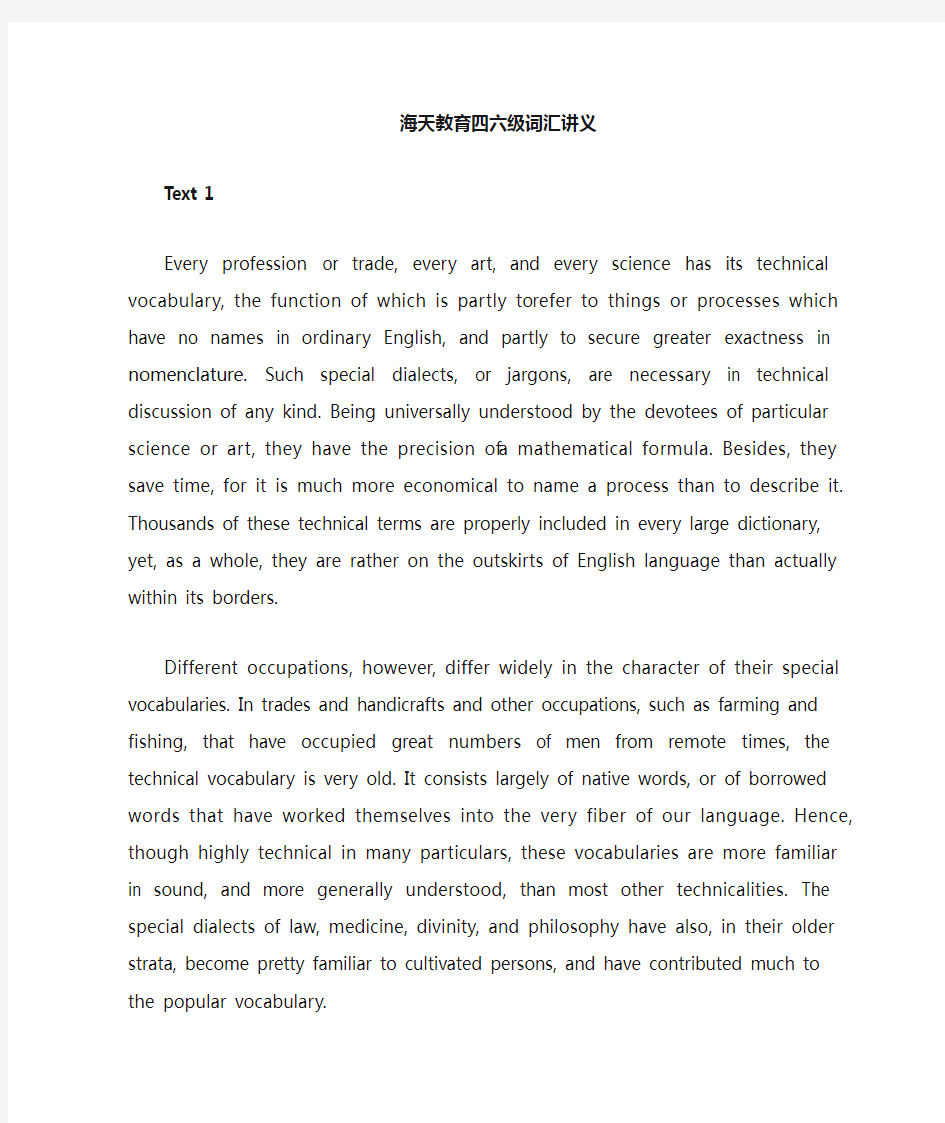英语四六级(CET4-6)-词汇讲义

- 1、下载文档前请自行甄别文档内容的完整性,平台不提供额外的编辑、内容补充、找答案等附加服务。
- 2、"仅部分预览"的文档,不可在线预览部分如存在完整性等问题,可反馈申请退款(可完整预览的文档不适用该条件!)。
- 3、如文档侵犯您的权益,请联系客服反馈,我们会尽快为您处理(人工客服工作时间:9:00-18:30)。
海天教育四六级词汇讲义
Text 1
Every profession or trade, every art, and every science has its technical vocabulary, the function of which is partly to refer to things or processes which have no names in ordinary English, and partly to secure greater exactness in nomenclature. Such special dialects, or jargons, are necessary in technical discussion of any kind. Being universally understood by the devotees of particular science or art, they have the precision of a mathematical formula. Besides, they save time, for it is much more economical to name a process than to describe it. Thousands of these technical terms are properly included in every large dictionary, yet, as a whole, they are rather on the outskirts of English language than actually within its borders.
Different occupations, however, differ widely in the character of their special vocabularies. In trades and handicrafts and other occupations, such as farming and fishing, that have occupied great numbers of men from remote times, the technical vocabulary is very old. It consists largely of native words, or of borrowed words that have worked themselves into the very fiber of our language. Hence, though highly technical in many particulars, these vocabularies are more familiar in sound, and more generally understood, than most other technicalities. The special dialects of law, medicine, divinity, and philosophy have also, in their older strata, become pretty familiar to cultivated persons, and have contributed much to the popular vocabulary.
Yet, every vocation still possesses a large body of technical terms that remain essentially foreign, even to educated people. And the proportion has been much increased in the last fifty years, particularly in the various departments of natural and political science and in the mechanic arts. Here new terms are coined with the greatest freedom, and abandoned with indifference when they have served their turn. Most of the new coinages are confined to special discussions and seldom get into general literature or conversation. Yet no profession is nowadays, as all professions once were, a close guild. The lawyer, the physician, the man of science, and the cleric associate freely with his fellow creatures, and does not meet them in a merely professional way.
Furthermore, what is called "popular science" makes everybody acquainted with modern views and recent discoveries. Any important experiment, though made in a remote or provincial laboratory, is at once reported in the newspapers, and everybody is soon talking about it——as in
the case of the Roentgen rays and wireless telegraphy. Thus, our common speech is always taking up new technical terms and making them commonplace.
Text 2
Here I want to try to give you an answer to the questions what personal qualities are desirable in a teacher? Probably no two people would draw up exactly similar lists, but I think the following would be generally accepted.
First, the teacher’s personality should be pleasantly live and attractive. This does not rule out people who are physically plain, or even ugly, because many such have great personal charm. But it does rule out such types as the over-excitable, melancholy, frigid, sarcastic, cynical, frustrated, and over-bearing: I would say too, that it excludes all of dull or purely negative personality. I still stick to what I said in my earlier book that school children probably “suffer more from bores than from brutes.”
Secondly, it is not merely desirable but essential for a teacher to have a genuine capacity for sympathy——in the literal meaning of that word; a capacity to tune in to the minds and feelings of other people, especially, since most teachers are school teachers, to the minds and feelings of children. Closely related with this is the capacity to be tolerant——not, indeed, of what is wrong, but of the frailty and immaturity of human nature which induce people, and again especially children, to make mistakes.
Thirdly, I hold it essential for a teacher to be both intellectually and morally honest. This does not mean being a plaster saint. It means that he will be aware of his intellectual strengths, and limitations, and will have thought about and decided upon the moral principles by which his life shall be guided. There is no contradiction in my going on to say that a teacher should be a bit of an actor. That is part of the technique of teaching, which demands that every now and then a teacher should be able to put on an act——to enliven a lesson, correct a fault, or award praise. Children, especially young children, live in a world that is rather larger than life.
A teacher must remain mentally alert. He will not get into the profession if of low intelligence, but it is all too easy, even for people of above-average intelligence, to stagnate intellectually——and that means to deteriorate intellectually. A teacher must be quick to adapt
